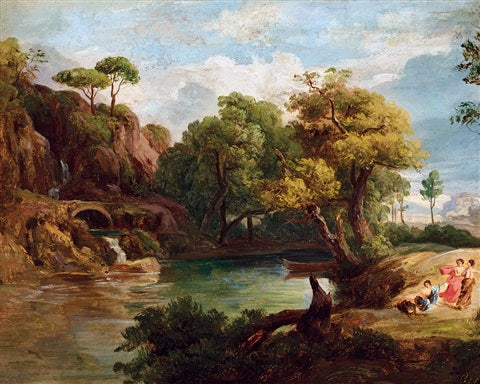Description
Károly Markó the Elder, also known as Károly Markó The Elder, is a prominent name in the nineteenth -century artistic panorama, in particular, within the romantic movement. His work "Women after the bat" (Women after Bat) is an exquisite representation of his ability to capture not only the beauty inherent in the landscapes, but also the subtle interaction of the human figure within them.
The painting, at first glance, shows two women in a post-base scene, immersed in nature. It is in the meticulous attention to detail and artistic composition where Markó's genius is fully revealed. Women, located in the center of the scene, seem to be in a moment of quiet reflection, after a bath that suggests the freshness and purity of the natural environment. The relaxed position of the figures and their rich clothing contribute to the work an atmosphere of serenity and elegance.
The surrounding landscape is a testimony of Markó's dominance in the painting of natural views. Green and brown tones, used in foliage and ground, create a harmonious contrast with the delicate clothes of the female figures. The sunset or dawn light allows shadows to play a fundamental role in the work, reinforcing the three -dimensionality of the scene and providing a depth that invites the viewer to immerse himself completely in this microcosm.
One of the most remarkable aspects of this work is how Markó subtly uses colors to emotionally impact the viewer. The warm tones used in human figures generate a feeling of intimacy and proximity, while the coldest tones of the landscape induce a contemplative state. This tension between human heat and the serenity of the natural environment is precisely what gives painting its distinctive character.
It is important to mention that, although this specific painting by Károly Markó The Elder may not be the most recognized within its portfolio, it does reflect the characteristics that make their work a lasting legacy. His ability to merge the human figure with the landscape in an almost poetic way is evident in works such as "Landscape With Ruth and Boaz" and "View of Lake Trasimeno," where the landscape acts as a silent but essential protagonist.
In terms of technique, attention to detail in each element from the leaves of the trees to the textures of the fabric demonstrates an artisanal expertise that is rarely achieved. This meticulousness is a characteristic feature of Markó, which always instilled in his compositions a deep sense of realism and lyricism.
When reflecting on "women after the bat," it becomes clear that Károly Markó The Elder was not only a landscape painter, but a visual narrator who used nature and the human figure to tell deep and emotional stories. His legacy lasts, not only in his individual works, but in the way we continue to appreciate and revalue his contribution to romantic art and European pictorial panorama of the nineteenth century.
In conclusion, "women after the bat" is a work that, through its balanced composition and its captivating color palette, captivates and retains attention, inviting the viewer to a deep reflection on harmony between nature and humanity.
KUADROS ©, a famous paint on your wall.
Hand-made oil painting reproductions, with the quality of professional artists and the distinctive seal of KUADROS ©.
Art reproduction service with satisfaction guarantee. If you are not completely satisfied with the replica of your painting, we refund your money 100%.

